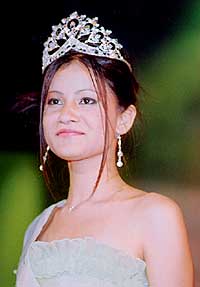 All through the past three weeks, some vocal members of the Nepali left led a public campaign against the Dabur Vatika Miss Nepal Beauty Pageant, which was held last Saturday. Two of their various charges were directly against the market. First, they claimed that such a pageant discriminates against a large swath of the Nepali female population, and second, it is nothing more than a capitalist set-up to lure so-called "beautiful" women to literally dance to the tune of multinationals for a year or more. Both of these charges are correct, but not for the reasons the left is so fond of trotting out.
All through the past three weeks, some vocal members of the Nepali left led a public campaign against the Dabur Vatika Miss Nepal Beauty Pageant, which was held last Saturday. Two of their various charges were directly against the market. First, they claimed that such a pageant discriminates against a large swath of the Nepali female population, and second, it is nothing more than a capitalist set-up to lure so-called "beautiful" women to literally dance to the tune of multinationals for a year or more. Both of these charges are correct, but not for the reasons the left is so fond of trotting out. Nowadays, thanks to competition, private companies have come to see beauty as an attribute that gives them an edge in the marketplace-both in terms of their products and people. Competition is the reason why this newspaper, for one, takes layout, design and photographs (all attributes of beauty) as seriously as it takes the written word. It is also the reason why Nepali firms-as in the case of carpet companies-are finally starting to spend a fortune hiring designers to package, place and market their products in an attractive manner. It further explains why newscasters working for private Nepali tv channels are younger and better-looking than the ones on state-run Nepal Television who uniformly look as though they have just come back from a funeral.
To quote the words of economist Virginia Postrel, who seems to reveal an embarrassing truth about us all: "Not only do human beings make judgements about how other people look, we enjoy doing so. In an age where we see more and more good-looking people, either directly or through the media, we are getting more and more judgmental. It would be better for our public discussions and for our mental health, if we simply admitted that we care about how other people look."
Viewed this way, beauty, regardless of whether it's natural or artificial, does become a discriminating factor in both our eyes and in the marketplace. In fact, in a widely cited study, economists Daniel Hamermash and Jeff Biddle reported 10 years ago that if a working woman is perceived to be beautiful, then, all things being equal, she will probably earn 5 percent more than her ordinary looking co-workers. Put another way, the market rewards beauty with the same logic that it rewards, say, Sangina Baidya's athleticism-that is, by paying more for a unique attribute that it values.
All this probably made intuitive sense to self-selected ambitious young adults who lined up-voluntarily and with eyes wide open-to take part in the Miss Nepal Pageant. They know that in these times, with more and more educated men and women entering the labour force, when there are fewer jobs to go around, the competition to do well as a professional is getting fiercer than what it was before.
In this context, the pageant's allure was that it marketed itself as a bona fide legal shortcut to lucrative and visible employment opportunities. Who knows, the participants may never use Dabur Vatika shampoo again, but they were smart enough to seize the opportunity for themselves to boost their own career prospects in these competitive times. After all, it is such opportunities that make it possible for, again in Postrel's words, "attractive women [to] make a living from their looks-whether directly as models [with legally valid contracts] or indirectly as saleswomen or [TV newscasters and hosts]-without trading sexual favours". Surely that's the kind of women's independence that even the Nepali left, in its admirable quest to expand the degrees of freedom for all, can appreciate.



